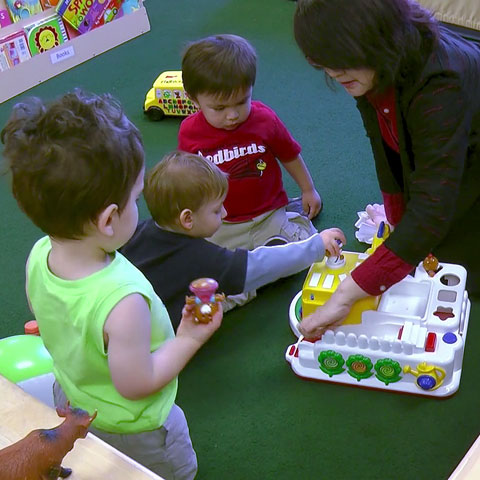About this Video
This Early Learning Moment provides an over view of the Self-Regulation: Foundation of Development section in the Illinois Early Learning Guidelines for Children Birth to Age 3. Self-regulation refers to how children take in information from both their bodies and their environment and how they respond to that information.
The ability to regulate one’s responses to the world is the foundation upon which all other development occurs. Self-regulation includes physiological regulation, emotional regulation, attention regulation, and behavior regulation. Physiological regulation refers to the way children manage their body processes, such as sleep/wake cycles, eating, and elimination. Emotional regulation refers to how children manage their feelings. Attention regulation refers to the ability of young children to determine which stimuli, such as sound or light, are most important to focus on. Behavior regulation refers to how children manage their responses with their body or voice. Young children are using all these different systems of self-regulation at the same time.
The ability to self-regulate is developing in the infant toddler period, and tantrums or crying are normal ways that children behave. Adults play the important role of responding to and guiding children’s behavior, and this is referred to as coregulation.
Video
Setting Up for Success
In the video, we learned more about how adults can support the development of self-regulation in infants and toddlers.
Subsections for Self-Regulation
- Physiological Regulation
Children demonstrate the emerging ability to regulate their physical processes in order to meet both their internal needs and external demands in accordance with social and cultural contexts. - Emotional Regulation
Children demonstrate the emerging ability to identify and manage the expression of emotion in accordance with social and cultural contexts. - Attention Regulation
Children demonstrate the emerging ability to process stimuli, focus and sustain attention, and maintain engagement in accordance with social and cultural contexts. - Behavior Regulation
Children demonstrate the emerging ability to manage and adjust behaviors in accordance with social and cultural contexts.
Self-Assessment and Reflection
This video presented examples of how adults can foster a self-regulation in young children. Now, consider your interactions with infants and toddlers and how you might support the development of these foundational abilities.
Does your space have:
- Places where children can be loud and move and use their bodies?
- Places that are quiet where children can rest and calm down?
- Comfortable seating where adults can hold or rock infants and toddlers when they are upset?
- The ability to adjust lighting and music as a tool for calming or soothing children?
Are you ready to:
- Observe young children closely and respond to their need for support?
- Talk to young children and narrate the way they might be feeling, based on your observations?
- Reflect upon your responses to children’s behavior so you can figure out which responses suit a particular child?


